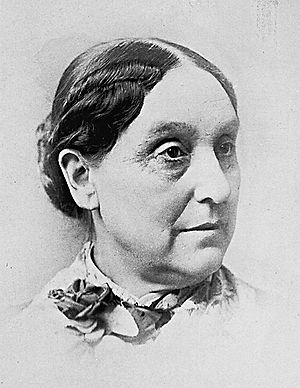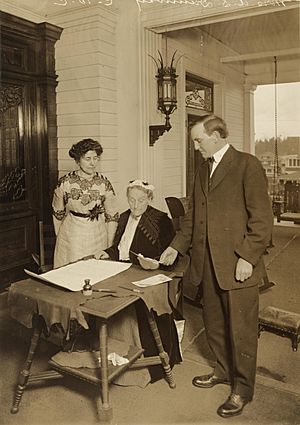Abigail Scott Duniway facts for kids
Quick facts for kids
Abigail Scott Duniway
|
|
|---|---|

Duniway between 1870 and 1900
|
|
| Born |
Abigail Jane Scott
October 22, 1834 farm near Groveland, Illinois, U.S.
|
| Died | October 11, 1915 (aged 80) Portland, Oregon, U.S.
|
| Resting place | River View Cemetery in Portland |
| Known for | Women's suffrage leadership, writing, journalism, pioneer farming |
| Spouse(s) | Benjamin Charles Duniway |
| Children | 6 |
| Parent(s) | John Tucker Scott and Ann (Roelofson) Scott |
| Relatives | Harvey W. Scott, brother; Catherine Amanda Coburn, sister |
Abigail Scott Duniway (October 22, 1834 – October 11, 1915) was an important American leader who fought for women's rights. She was a newspaper editor and writer. Her hard work helped women gain the right to vote in the United States.
Contents
Who Was Abigail Scott Duniway?
Abigail Jane Scott was born on October 22, 1834. Her family lived on a farm near Groveland, Illinois. She was one of nine children who grew up on the farm. Abigail went to a local school when she could.
A Long Journey West
In March 1852, Abigail's father decided to move their family to Oregon. This was a long journey of about 2,400 miles (3,860 km) by wagon. Sadly, Abigail's mother died during the trip in June. Her youngest brother, Willie, also died in August. In October, the family finally reached their new home in Lafayette, in the Willamette Valley.
Starting a Family
In early 1853, Abigail taught school in Eola. On August 1, she married Benjamin Charles Duniway, a farmer from Illinois. They had six children together: Clara Belle, Willis Scott, Hubert, Wilkie Collins, Clyde Augustus, and Ralph Roelofson.
Facing Hardships
The Duniways farmed in Clackamas County. Later, they moved to a farm near Lafayette. They lost this second farm because a friend did not pay back money Benjamin had promised to cover. Soon after, Benjamin was badly hurt in an accident. He could no longer work on the farm.
This meant Abigail had to find a way to support her family. She first opened a small boarding school in Lafayette. In 1866, she moved to Albany. There, she taught at a private school for a year. Then, she opened a shop that sold hats and sewing supplies. She ran this shop for five years.
Fighting for Women's Rights
While running her shop, Abigail heard many stories from married women. They told her about unfair treatment and injustices they faced. These stories made her angry. Her husband, Benjamin, encouraged her to do something.
In 1871, Abigail moved to Portland. She started a weekly newspaper called The New Northwest. This newspaper was all about women's rights, especially the right for women to vote, known as suffrage. She published the first issue on May 5, 1871. She continued to publish The New Northwest for 16 years.
Speaking Out for Change
In 1872, Abigail was asked to speak to Oregon's lawmakers. She wanted to convince them to let women vote. She was representing the Oregon State Woman Suffrage Association. At first, no other women wanted to join her. They were afraid of what their husbands and others might say. Finally, Dr. Mary Sawtelle agreed to go with her into this meeting, which was usually only for men.
Abigail faced many challenges. She had health problems and money troubles. Her own brother, Harvey W. Scott, who edited another newspaper, The Oregonian, wrote articles against women getting the right to vote. She kept going despite people in her local area being against her. Women's suffrage votes on state ballots often failed. There were also disagreements with other women's rights groups from the Eastern U.S.
However, Abigail and her newspaper worked hard to support new laws. These laws, like the Sole Trader Bill and the Married Women's Property Act, gave women in Oregon the right to own and control their own property.
A Victory for Women
Abigail's hard work finally paid off in 1912. Oregon became the seventh state in the U.S. to pass an amendment allowing women to vote. Governor Oswald West asked her to write and sign the official statement for equal suffrage. She was the first woman to register to vote in Multnomah County.
Abigail Scott Duniway passed away on October 11, 1915. She is buried at River View Cemetery in Portland.
See Also
 In Spanish: Abigail Scott Duniway para niños
In Spanish: Abigail Scott Duniway para niños


